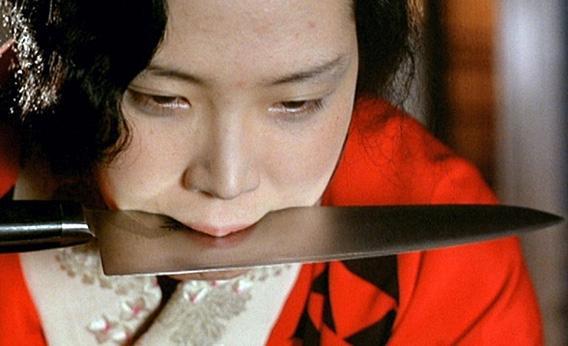The great Japanese director Nagisa Oshima, who died earlier this week at 80, was a key figure in the Japanese new-wave cinema of the 1950s, ’60s, and ’70s. Over the course of a four-decade career (his last film, Taboo, came out in 1999), Oshima never stopped experimenting, whether formally or in terms of subject matter. And even as an older, established filmmaker (and a fixture on Japanese talk shows) Oshima remained reliably perverse, ever ready to test the boundaries of both the censors and his audience. Max Mon Amour (1986) tells the story of a French diplomat’s wife (Charlotte Rampling) who falls passionately in love with a male chimpanzee, while the WWII internment-camp drama Merry Christmas, Mr. Lawrence (1983), starring David Bowie and Takeshi Kitano, gained a cult following for its homoeroticism, which was shockingly explicit for the time.
But Oshima will be best remembered—both in the popular imagination and in my own—as the director of In the Realm of the Senses, a sexually graphic retelling of a real-life tabloid scandal turned popular folk legend. The film was the object of an international obscenity scandal upon its release in 1976. It took 20 years for the uncut film to be projected in the United States; after nearly 40, an uncensored version has yet to be shown in Japan.
In the Realm of the Senses (the title is sometimes translated as Empire of the Senses, and in Japanese means something more like Bullfight of Love) depicts the passionate, destructive amour fou between a prostitute-turned-chambermaid, Sada (Eiko Matsuda), and Kichi (Tatsuya Fuji), the married man who owns the inn where she’s employed. After beginning an obsessive affair, Sada and Kichi drop out of society, drinking and fucking their way from one geisha house to the next in a downward spiral of dissolution—or is it an upward spiral toward erotic transcendence? It all ends (as did the real-life story, with which every Japanese viewer of the time would have been familiar) in a Wagnerian Liebestod, complete with strangulation, castration, and a love message scrawled in blood across sheets and skin.
It is, I suppose, a shame that a filmmaker as multifaceted (and as fiercely political) as Oshima will be remembered primarily for his raunchy succès de scandale. But you’ll have to look elsewhere for a critic to champion the director’s obscure cuts, because In the Realm of the Senses happens to be one of my cinematic Ur-texts, a movie that would easily find its way onto my personal list of top 10 films of all time. When I heard the news that Oshima had died, it was my vivid sense memory of this film—which I’ve seen probably half a dozen times in my life, the last of them more than 15 years ago—that sent me to my editor asking if I could write something on Oshima: neither an obituary nor a review, but a history of my now decades-old love for his most famous film. And then my editor said yes, and I almost wished I hadn’t asked.
The idea of re-entering the realm of Senses was scary on multiple levels. First there was the intensity of the movie itself, which is as unrelenting an aesthetic experience as a Greek tragedy or the abovementioned Wagner opera—basically, we’re talking an hour and a half straight of graphic, unsimulated sex scenes that steadily escalate into a literal orgy of violence and mutilation. Second, there was the even more daunting project of revisiting my 20-year-old self, who had made this movie such a pillar of her aesthetic canon ever since seeing it at a repertory house in Paris. Forget how the movie would hold up—how would I hold up if I no longer loved the film as I once had? Would the now me discover that my younger self was impossibly self-dramatizing and pretentious?

Photo by AFP/Stringer.
I’ll get to the encounter between those present and past selves in a minute. But about the encounter between myself and the movie, I needn’t have worried. Even the seventh time through, under maximally banal viewing conditions—streamed from Amazon to my laptop, not rapt in the dark on the Rive Gauche—In the Realm of the Senses is a film like no other, a magical fusion of art and pornography that somehow renders debates about the distinction between those two categories boringly beside the point. Asking if this film is porn is like asking if prehistoric cave paintings showing men with erections are porn. They’re porn, they’re art, they’re elemental and beautiful; it doesn’t matter.
In the Realm of the Senses isn’t about sex, it is sex: Sex is the medium it moves in and the language it speaks. The story seems to unfold in a parallel universe where virtually every social gesture is also a sexual one: Before the lovers even meet for the first time, we’ve already witnessed an attempted girl-on-girl seduction, an act of shared voyeurism, and a homeless old man being mocked by children who throw snowballs at his exposed genitals. And once Sada and Kichi’s affair gets rolling, forget about it. These two use sex acts of steadily increasing kinkiness (including some questionably consensual encounters with servant girls and an elderly geisha) to express every interpersonal affect from jealousy to hostility to ruinous passion. They’re bonobos in kimonos.
Of course, sex (especially filmed sex) is always about more than just itself, and In the Realm of the Senses is simultaneously, and subtly, a film of social protest against the repressive government and socially conservative culture of postwar Japan. There’s a powerful, dialogue-free late scene in which Kichi, reduced to a wraith by Sada’s insatiable demands, briefly leaves what can only be described as their sex den for a walk through the village. He passes a military parade cheered on by a crowd waving Japanese flags. (The film is set in 1936, when the empire was undergoing an intense period of military mobilization.) The image of Kichi shuffling blearily up the street in the opposite direction from the line of marching soldiers drives home Oshima’s point with exquisite simplicity: His lovers may be too wrapped up in each other’s body to be conscious protesters, but their very deviance from societal norms—their pursuit of carnal pleasure at the cost of all else—makes them, in some way, radical.
If In the Realm of the Senses is sex, then in my 20s I became something of a nymphomaniac. I don’t know that the film had any direct impact on my sexual behavior—I didn’t start carousing with geishas or strangling men with obi belts—but it certainly had an impact on my moviegoing behavior, the way I thought about what movies could and should do. I fell hard for In the Realm of the Senses during a time in my life—in many people’s lives, I think—when intensity and passion were highly valued qualities, in the movie theater and out. This was one of the films I would drag new boyfriends to see, in an act of seduction that was also the throwing down of a cinephilic gauntlet: Could they go the distance? (Once, memorably, I took a guy I didn’t know very well to it on a first date, never to hear from him again. Just as well.)
Now, in my mid-40s, I experience In the Realm of the Senses a little differently: I identify far less with the self-and-other destructive passion of the unstoppable Sada, and sometimes found myself wanting to scold her in the words of the respectable old sugar daddy who unknowingly supports her and Kichi’s lifestyle: “Sada, think of your future!” Additionally, two and a half decades on in my own sexual life, I now know that I will never do most of the things pictured in this movie (especially those involving hard-boiled eggs) and feel nothing but relief at that fact.
But everything that made me fall for In the Realm of the Senses in the first place is still there, and as marvelously seductive as ever: the film’s lavish pictorial beauty (virtually every frame could be the subject of a Japanese erotic woodblock print); its haunting love theme; and the incredibly vibrant and naturalistic and often funny connection between the two lovers, played by Mitsuda and Fuji with such delicacy and finesse it’s almost impossible to not believe that the love, like the sex, was unsimulated. Watching In the Realm of the Senses again and discovering I still loved it freed me to view that younger, Sada-identified, peak-experience-seeking me with amusement and affection. I probably was self-dramatizing and pretentious—forgive me, dudes I dated—but when it comes to this movie, I was right.
